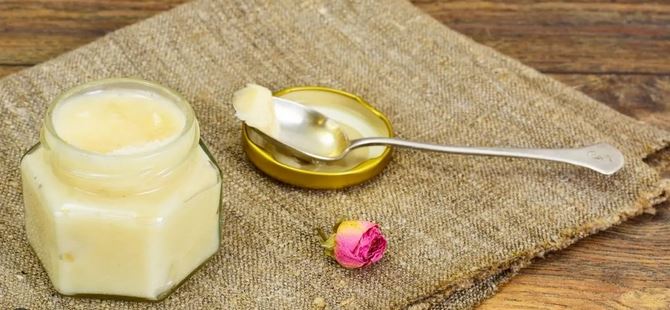
Raw Honey vs. Processed Honey: What’s The Difference??
Raw honey is essentially honey in its purest form, extracted from honeycombs, straight from the beehive. It's not subjected to heat or filtration, preserving its natural composition, which includes numerous antioxidants, enzymes, vitamins, and minerals. These compounds are believed to be responsible for many of raw honey's health advantages.
Raw honey can be liquid or creamed.
Liquid Raw Honey tends to crystallize within 1-2 months of being extracted from the beehive. If you see anything claiming to be Raw Honey on the shelves of grocery stores that is more than 2 months past its production date, you can be well assured that it isn’t raw at all! It has most likely been pasteurized, filtered, both, or mixed with additives to keep it in its liquid form.
That is definitely not desirable!
Instead, to keep the Raw Honey soft and velvety, it can be churned. This is essentially Creamed Raw Honey. This is usually how raw honey makes its way into major grocery outlets so it can be distributed without getting overly crystallized.
Fun Fact: Creamed Honey is a uniquely Canadian invention! It was pioneered here as a way to keep raw honey as fresh as possible, for as long as possible, without needing to heat it and liquefy it!
The Liquid Honey Predicament
The liquid honey you find in grocery stores is more thank likely pasteurized. However, the pasteurization process for honey is not standardized like it is for milk or juice. In other words, it is not intended to defeat impurities in the honey.
Each brand has its method to pasteurize liquid honey - for example, a method known as “Flash Heating” is sometimes used, which renders the honey liquid and kills off a lot of the enzymes found in honey.
This is also not desirable! So why do they do it?
Large-scale honey processors heat the honey to its boiling point and then cool it repeatedly to ensure that it does not crystallize. This is to encourage sales because people generally don’t like to buy crystallized honey. We think this is a missed opportunity - pure, crystallized honey can be easily liquefied by applying a bit of heat to it, or it can be made into creamed honey with a household blender!
At Elias, we stand out from the rest by minimally pasteurizing the honey - in other words, we heat it just enough so it can be filtered properly while maintaining most of the beneficial enzymes, minerals and health-supporting compounds in the honey.
Unfortunately, that does mean it will crystallize over time, but it’s easy to turn it back into its liquid form with a little TLC.
Side Note: There are some exceptions to unpasteurized raw honey staying liquid - honey from Kashmir, in the northern regions of India/Pakistan, doesn’t seem to crystallize for many months…however, this is the exception, not the norm!
The Battle of Nutrients: Raw vs. Processed Honey
To understand which type of honey is more nutritious, we need to compare the nutritional profiles of raw and processed honey.
After being removed from the honeycomb, raw honey is honey that has not been heated or processed in any manner. This ensures that all its natural enzymes, antioxidants, and other essential elements are retained. Raw honey is thicker and may contain tiny particles of beeswax, pollen, and propolis, all of which are natural and healthy components of honey.
Aside from retaining most of the bacteriostatic and antibacterial properties naturally found in honey, liquid, pasteurized honey exhibits lower antioxidant activity and a reduction in enzymatic activity than its raw counterpart.
However, this isn’t necessarily a bad thing!
Pasteurizing honey removes yeast cells that naturally occur in some kinds of honey, and it neutralizes a bacterium that could cause infant botulism - a sickness that rarely occurs in infants under the age of 18 months after consuming raw honey. Note that not only is this a rare phenomenon, but it only affects infants under the age of 18 months since they do not have the proper gut bacteria to process this agent found in some types of raw honey.
What is more important is the purity of the honey - some commercial honey manufacturers may add other compounds to their processed honey, such as high-fructose corn syrup or artificial flavors. A study conducted by the Canada Food Inspection Agency found that 94% of honeys imported into Canada (i.e. those sold under a foreign brand) were tainted with sugar, syrups or other additives!
What’s The Bottom Line? Make the Choice for Your Health and Goals!
Ultimately, the decision between raw and pasteurized honey comes down to your health priorities and preferences!
You’ll love creamed, raw honey if you:
- Are or want to use honey as a health and/and dietary supplement
- Love the deep, aromatic taste of honey, without it tasting overly sweet
- Are over the age of 18 months, and are looking for a healthy alternative to sugar
- Want to retain honey in your pantry without the threat of it crystallizing
- Want to use it as a spread AND as a sweetener, since it easily liquefies once heated
On the other hand, you’ll love pasteurized liquid honey if you:
- Use honey every day
- Don’t mind liquefying it when it crystallizes
- Love the sweetness and sweet taste of honey, or use it as a substitute in no-bake or baked items
Most importantly of all, check the source of where your honey comes from! If you're ready to try 100% Pure, Canadian, Natural, Organic and Raw Honey and Liquid honey, browse our extensive selection of honeys! Available in six gourmet varieties for you to explore and enjoy your meals daily! And, if you’re really in the market for something special, try our brand new, exclusive to Elias Honey, Cold Press Honeys! They are a magnificent, sweet, and healthy treat for anyone who loves honey!





